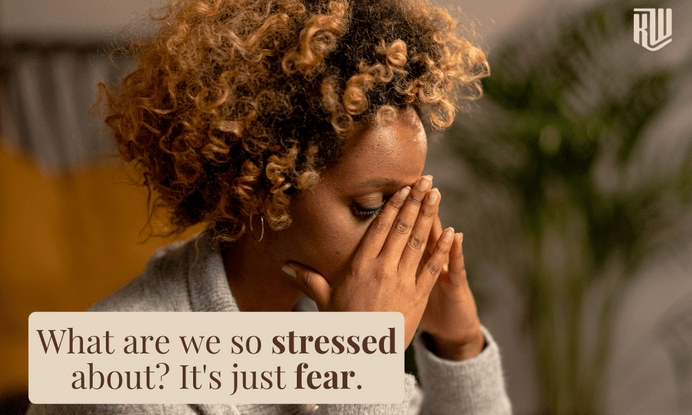Estimates from the AMA and the CDC conclude that stress accounts for between 70-95% of all illnesses and diseases and our daily suffering. However, I believe the problem persists partly because helping professionals are not accurately communicating what a person experiences when “stressed.”
Therefore, the solutions we promote and provide are ineffective in alleviating the growing epidemic of stress.
Stress
“Conventionally, stress is defined as a transactional process arising from real or perceived environmental demands that can be appraised as threatening or benign, depending on the availability of adaptive coping resources to an individual.” (1) emphasis added.
“When we’re startled or acutely stressed, the “fear center” of the brain, called the amygdala, activates our central stress response system.” (2) emphasis added.
In the amygdala’s view, a threat can be a person holding a gun to our head to a memory of something that has frightened us in the past, to even experiencing something new. Whether a threat is real or perceived does not matter to the amygdala. That is why it also relies on the hippocampus to draw on previous emotional memories stored physically in our body and brain cells.
How we communicate and attempt to alleviate stress?
Can you see the problem with how we communicate and attempt to alleviate stress? We are not telling people that when they feel “stress,”.
They are actually experiencing the fear reaction and, many times, just reliving adaptive coping responses from previous unprocessed hurtful emotions.
Therefore people are not getting the proper solution because we haven’t told them they lack the required Emotional Authenticity skills to navigate their past unhealed emotional pain and stress/fear responses.
Adding to the problem is how the helping community advocates talking about stress. Because practitioners call it “stress” instead of fear, it leaves the individual with the impression that stress randomly happens to them, and they are powerless to stop it without medication.
That has led to something even worse. By not using the correct term to define what a person is actually experiencing. The public infers that they are stressed because we are all super-achievers. Ask yourself what you assume when your friend opines they are “stressed?”
The universal implication is that they work 50-70 hours a week, take their partner out on five romantic dates a week, volunteer at their child’s school three hours a week, and oh, by the way, they must meditate, workout and donate time to their favorite charity.
In other words, They are stressed because they are accomplishing so much and probably more than we are.
Self-deception and false empowerment
By not calling stress what it is, we are advocating self-deception and false empowerment.
As practitioners, we are responsible for creating this false narrative of stress and robbing people of health and well-being by not removing fear’s stigma.
Instead, we are perpetuating the myth that to be afraid is to be weak. And where did we first learn to be invalidated as weak? Childhood! In Dr. Gabor Mate’s book, Scattered Minds, he shares this.
“Even the most benign parenting,” writes Allan Schore, the seminal psychological researcher, and therapist, “involves some use of mild shaming procedures to influence behavior.” (3)
In nearly every instance, the stress/fear response replicates and repeats the perfectly imperfect hurtful moments from childhood.
As professionals, we are not making them aware of this, and by not doing so, we impede the healing they deserve. Why are we so afraid to tell the public the truth that everyone is frightened all day, every day?
Today I propose addressing that shame by giving the public the accurate terminology and solutions they deserve to heal the primary source of stress; fear initiated by unhealed childhood pain that persists due to a lack of Emotional Authenticity.
It has been my experience that all stress/fears get expressed in one of three ways:
1- The fear of rejection
2- The fear of inadequacy
3- The fear of powerlessness
To help you remember these fears, just think R.I.P. Rest In Peace!
Rejection
The fear of rejection is one of our deepest fears. Feeling rejected sabotages our desire to belong. If you’ve ever applied for a job that you were counting on and were not hired or had your romantic interest rebuffed.
you know that feeling all too well. When we feel rejected, we feel unlovable, alone, or worth less. These feelings were first learned in childhood.
The CDC lists “early adverse life conditions” (4) as the number one source of all mental health conditions. As perfectly imperfect parents, we all had moments when we could not be there for our children.
That is not a sign of bad parenting; it is just a testament to how complicated life is for us all. But, those wounds carry on into our adult lives, and our brain seeks to repeat them if left unhealed.
If you are unaware that you experienced pain in childhood, I offer one question to bring clarity.
“Do you have any secrets from your primary caregivers? Anything you have felt, thought, said, done, or believe and don’t want them to know about?”
We all do. This is significant because, as a species, we will literally die if we don’t physically and emotionally attach to another human being. Do you see how that question informs us about our childhood?
The two people that we should be able to count on to accept us unconditionally won’t. The internal thought we have all adapted goes something like this:
“I can’t tell my parents this! if they knew what I actually thought, felt, believed, or have done, if they really knew who I am, I feel certain they would reject me.”
What could be more fearful than that?
Inadequacy
The fear of inadequacy is about feeling like we don’t have the knowledge, skills, or tools to accomplish something. It is an underlying sense that we may not be capable or good enough?
Let’s say you did get that job you wanted. But, arriving on the first day, you don’t know if you possess the knowledge, skills, or tools to get the job done? And what about office politics?
Who do you need to align with or avoid? Can you see now why stress is so out of control? By not calling stress what it really is, as professionals, we have left everyone inadequate to address their fears.
Nearly every individual lacks the knowledge, skills, and tools to become an expert in healing their painful childhood and emotions.
Powerlessness
The fear of powerlessness is about anything we do not control, and our sense of safety is gone. Think of powerlessness as an I can’t statement.
For example, “I can’t get someone to hear me, understand me, like me, love me, give me a raise, or recognize what I do.” How many times did we feel those feelings in childhood? Powerlessness is probably the most devastating of all the fear reactions.
Since we are an organism looking to survive, feeling powerless is primal and can leave us in a constant state of hyperarousal. The chemical cocktail of that prolonged arousal is the primary source that leads a brain and body to become diseased.
Now that we have a more transparent framework for the stress/fears we are experiencing, I offer some knowledge, skills, and tools to address these fears.
To conquer rejection
To conquer rejection, we need a new understanding that at no time are we ever rejected. A person may say they prefer blonde over brunette, steak over fish, republican over democrat, short over tall, less experience over more experience.
Whatever it may be, their decision has nothing to do with us. Do you see in every instance, they are just choosing what is best for them.
Even when they try to blame us, it has nothing to do with us. That person has just decided they would prefer something or someone else.
Therefore, if we choose to believe we have been rejected, we have lost containment of our inner feeling reality and placed the decision on whether we have inherent worth into another person’s hands. To conquer the fear of rejection, we need Emotional Authenticity over our childhood pain and codependence recovery in self-esteem and boundaries.
Conquering inadequacy
Conquering inadequacy is the most straightforward fear to overcome. All that is required is to become an expert and gain the knowledge, practice, and develop the resulting skills until they become familiar and valuable tools.
For instance, If you were leaving home, heading to college, and worried you’ll be lost on campus, arrive early, walk the buildings, and become familiar with the layout.
Most relationship failures fall into this category. I find it fascinating that a person must have a license to cut our hair, something that will grow back perfectly on its own no matter how bad it gets butchered.
But, we don’t take a single class on being a parent or having a relationship. The single most important and “stressful” adventures of our lives, we are lacking the necessary knowledge, skills, and tools. As my mom used to say, “we just wing it.”
When it comes to redefining stress more accurately, we might consider a new way to look at the existing knowledge and contemplate it (skills) until our brain becomes acquainted (tools) and accepts the unique proposition.
The solution to powerlessness is the most involved because there are many ways we need to address what creates our feeling of a loss of control.
The main contributors for our loss of control are:
1- Focusing on what we can’t control vs. what we can control
2- The inability to say no
3- The inability to trust the process of life.
Focusing on what we can control
When my client is stuck obsessively ruminating on all of the things they can’t control, I suggest that they grab a piece of paper. On one side, list all people, places, and things they have no control over. On the other, using the same categories, list all that they can control.
For instance, there is absolutely nothing we can control in another person. But, we do have control over our thoughts, feelings, choices, and behaviors.
So, when we feel powerless over others, all we have to do is focus on what we can control, our thoughts, feelings, choices, and behaviors.
Learning to say no is one of the most empowering experiences we can have. I provide all of my clients with these simple criteria to ask themselves before saying yes to anyone or anything.
I remind them that if saying yes violates any of these, it would be best to say no. If not, they are choosing to “give” themselves away and create their powerlessness.
Therefore, they must own any result from saying yes and never blame or place responsibility on the other person.
No Is the most loving word we can say to anyone formula:
• Does this request go against my morals, values, needs, wants, negotiable’s or non-negotiable’s
- If I say yes, will I feel resentful now or in the future?
- I feel they owe me, or will I keep score?
- I throw it back in their face that I did this for them?
- Do I have the reserves to say yes?
You see, if any of these conditions surface now or in the future, it lets us know that we were only saying yes because we were hoping to control the other person in the future.
We did not do it freely. We may have done it for recognition or wanted something in return, or we went against ourselves? In some cases.
We may have been too tired, but we did it anyway. In other words, we said yes when we wanted to say no, we created our powerlessness, and we are trying to take the anger at ourselves out on the other person.
Anger in any form and at any time is fear, and most often, the fear of powerlessness.
Not Trusting The Process of Life
By nature, much of life is just unpredictable and out of our control. Many times in life, there is not an immediate solution. It requires something else to happen first.
For instance, I had spent over 20 years reading, researching, and working with counselors to heal my addictions and childhood pain.
It wasn’t until the divorce from my second narcissistic wife that all the pieces fell into place. As we all do, I picked a similar person to one of my parents to relive my unhealed trauma.
I needed to experience the intense grief tied to my childhood, which could only come from my experience with her. She was the gift that created my freedom.
I owe my life to her. Therefore, If you find you have taken action on everything possible but still find yourself in a powerless place, I suggest this five-step process.
From Powerless To Powerful Formula
- Gather information
- If information is not definitive, wait for a life experience to bring clarity.
- While waiting, take action on what you can control
- Re-evaluate after each life experience
- Make empowered choice
As helping professionals, If we want to help others conquer their stress, it might require addressing our fears of rejection, inadequacy, and powerlessness by providing the public with misleading and innocuous terminology.
And, prescribing pills instead of giving them the knowledge, skills, and tools to gain Emotional Authenticity and heal their childhood pain?
After all, fear is just an emotion. Why are we so afraid of it?
* Disclaimer-
The information provided is introductory only. In no way does this reflect the complete explanation of the fear process.
Nor does it provide the complete process required to heal childhood pain, achieve Emotional Authenticity, or successfully navigate all the subtleties of the fear response.




